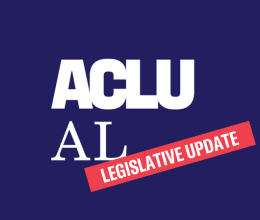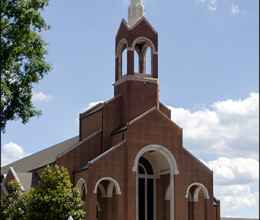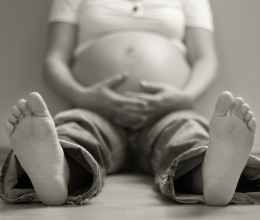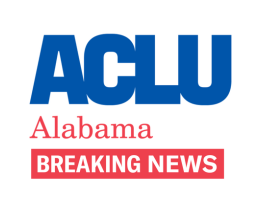
The 2017 legislative session ended May 19, and to many, it seemed to be among the most contentious of recent years. In addition to the removal of Chief Justice Roy Moore and the resignation of Governor Robert Bentley, there were heated debates over many issues such as the federal court-ordered reapportionment, prison construction, confederate monuments, and a racist joke about monkeys.
Of note, there were several bills introduced that claimed to defend religious liberty. In fact, they are sanctioning discrimination against the LGBT community and others. There were also several attempts to further restrict reproductive rights. A list of these bills and their statuses are included below. This is not a comprehensive list of all legislation discussed this year.
Religious Liberty
PASS - HB 24, the "Child Placing Agency Inclusion Act," was passed and signed into law on May 3. It allows religious adoption agencies to refuse child placement to families who do not share their religious beliefs. While this will most likely discriminate against same-sex couples, there is a possibility that a religious agency could refuse an interfaith or non-religious couple, single parents, or even a couple with one parent who was previously divorced.
The ACLU of Alabama is interested in talking with people adversely affected by this new law, particularly children who are being denied placement in willing homes because of the law.
FAIL - SB 193, the Briarwood Presbyterian Church bill, passed the Senate on April 11 but did not come to the floor for a vote in the House. This bill would have authorized a separate police force for the church, which would have vested state powers in a religious body and violated the Establishment Clause of the Constitution. Even though this version failed to pass, it did not lack support, and we expect to see a similar effort next year. We will continue to fight against legislation like this that threatens the separation of church and state. We are interested in talking with anyone who would be adversely affected by the creation of a police force at Briarwood.
FAIL - SB 139, the Ten Commandments bill, passed the Senate on May 11 but did not make it out of committee in the House. This bill would have proposed an amendment to the Alabama Constitution to permit the display of the Ten Commandments on state property and in public schools.
Reproductive Rights
PASS - HB 95, the "Alabama Health Care Rights of Conscience Act," was passed and signed into law on April 27. With this new law, healthcare providers are exempted from performing certain services related to abortion, sterilization, stem cell research, and cloning based on their religious or ethical beliefs. The bill stipulates an exception for emergencies, but it still allows for discriminatory behavior such as pharmacists who refuse to sell certain contraceptives and doctors who refuse to treat a patient who has had an abortion.
PASS - HB 98, the "Right to Life" Amendment, was passed on April 25 and will be on the statewide ballot on November 6, 2018. This is a legislatively referred constitutional amendment that will "declare and otherwise affirm that it is the public policy of the state to recognize and support the sanctity of 'unborn life' and the rights of 'unborn children,' including the right to life." This bill is largely symbolic as abortion rights are protected federally by Roe v. Wade, but should that ever be overturned by the Supreme Court, then abortion access could be denied to Alabamians.
FAIL - HB 131, the "Alabama Ultrasound Access Act," did not make it out of committee in the House. This bill would have required abortion providers to perform an ultrasound for pregnant patients seeking an abortion and disclose their income received from performing abortions for the previous year. The ACLU of Alabama would have challenged this law had it passed.
FAIL - HB 154, the "Fetal Heartbeat Act," did not make it out of committee in the House. This bill would have prohibited healthcare providers from performing abortions after a heartbeat could be detected, with penalties including revoking the medical license of the physician. The ACLU of Alabama would have challenged this law had it passed.
Criminal Justice
PASS - SB 187, the "Fair Justice Act," was passed May 16 and signed on May 18. This new law reduces the appeals time in capital cases by requiring convicted persons to file post-conviction claims at the same time as appeals. These cases deal with death row inmates facing lethal injection, so speeding up the process is likely to lead to wrongfully convicted individuals being executed before they can provide evidence of their innocence.
PASS - SB 16, the judicial override bill, was passed April 4 and signed on April 11. This new law prevents judges from overriding the will of the community by imposing the death penalty when a jury has recommended life imprisonment. While we applaud this change, Alabama is still the only state that does not require a unanimous jury for the death penalty.
PASS - HB 282, the "Definition of Moral Turpitude Act," was passed on May 17 and signed on May 25. This new law clearly establishes which felony convictions are considered to be crimes of moral turpitude. These convictions result in the loss of the right to vote; however, individuals with these convictions may be eligible to apply to restore it. Since determining which crimes are of moral turpitude has historically been left to the individual county voter registrars to interpret who can and cannot vote, it has disproportionately affected the African American communities in Alabama. By defining which crimes fall within this category, voting rights can be restored to many whose crimes are not on this list and will not be refused to those who might have been discriminated against in the past.
The proposal to construct new prisons to replace the overcrowded, poorly maintained prison system was not addressed. There is likely to be a special session later this year on this subject, and we will continue to provide legislative updates if there is. Check back for that and more, as next year's regular session will begin in January 2018.
Thanks to our partners and lobbyists working in the legislature to bring justice to Alabama, and to everyone who called, wrote, and emailed your representatives. Your voices make a difference.
"It is easier to resist at the beginning than at the end." -- Leonardo da Vinci
Photo: "AL House of Representatives" by Exothermic on Flickr, licensed under CC 2.0




